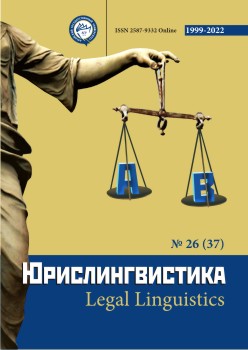Interpretation of the Law in the Light of Postmodernism
УДК 348 ББК 67.0
Abstract
The article analyzes the reasons for neglecting the truth in the process of interpretation of law and proposes ways for modern jurisprudence recovery. The updating of the spirit of the law makes it possible to correctly sort out priorities when legal values clash. The hierarchy of values in law presupposes respect for the truth. However, postmodernism rejects pursuance of the truth, it is interested in the multiplicity of approaches as such. The author of the article notes the dangers associated with the dominance of postmodernism in the legal process. Globalism exaggerates ambiguity in jurisprudence, that is, a variety of meanings and content. Such ambiguity is not justified by objective factors. The globalizers of the world need ambiguity of law in to maintain and aggravate the problem of interpreting (explication) the law, so that due to ambiguity one can bring a different meaning to any norms and principles without specifying it for the time being. Consequently, they act according to the situation, guided by considerations of benefit. The well-known concept of hypocrisy stems from ambiguity. Jurisprudence serves the world generally characterized with decentralization, fragmentation, pluralism, eclecticism, multiplicity, uncertainty, discontinuity, volatility, etc. It is not belief system that is foregrounded by the philosophy of postmodernism, but rather attitude, thus rationality swaps with sensuality: a logically formed paradigm gives way to emotional reactions. Postmodernists, as a fighting unit of globalism, consider it impossible and useless to try to establish any hierarchical order or any system of priorities in life. If they allow the existence of a model of the world, then it is based on entropy only, on the balance and equivalence of the good and the evil, of all constitutive elements.
Downloads
Metrics
References
Bauman Z. Life in Fragments: Essays in Postmodern Morality. Oxford, 1995.
Вельш В. Постмодернизм: генеалогия и значение одного спорного понятия / Путь. 1992. № 1. С. 113-182.
Ницше Ф. Воля к власти: опыт переоценки всех ценностей. М., 2001.
Пружинин Б.И. Историзация методологической рефлексии науки и методологии / Гносеология в системе философского мировоззрения. М., 1983.
Пучков О.А. Антропологическое постижение права. Екатеринбург, 1999.
Терещенко Н.А., Шатунова Т.М. Постмодерн как ситуация философствования. СПб, 2003.
Copyright (c) 2022 Виталий Сорокин

This work is licensed under a Creative Commons Attribution 4.0 International License.
The authors, which are published in this journal, agree to the following conditions:
1. Authors retain the copyright to the work and transfer to the journal the right of the first publication along with the work, at the same time licensing it under the terms of the Creative Commons Attribution License, which allows others to distribute this work with the obligatory indication of the authorship of this work and a link to the original publication in this journal .
2. The authors retain the right to enter into separate, additional contractual agreements for the non-exclusive distribution of the version of the work published by this journal (for example, to place it in the university depository or to publish it in a book), with reference to the original publication in this journal.
3. Authors are allowed to post their work on the Internet (for example, in a university repository or on their personal website) before and during the review process of this journal, as this may lead to a productive discussion, as well as more links to this published work (See The Effect of Open Access).











